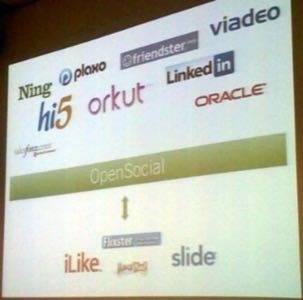Techcrunch has sniffed out details on Google’s new social network project, named OpenSocial (set to go live Thur US). OpenSocial is not a social network itself, rather it is a set of three common APIs that allow developers to access the following core functions and information at social networks:

- Profile Information (user data)
- Friends Information (social graph)
- Activities (things that happen, News Feed type stuff)
These are 3 fairly generic API calls – specialized data will remain the responsibility of the “hosts”, which currently include Orkut, Salesforce, LinkedIn, Ning, Hi5, Plaxo, Friendster, Viadeo and Oracle. Developers already signed up include Flixster, iLike, RockYou and Slide – who you will recognize as being ‘power developers’ on Facebook.
Image via Techcrunch

What this means
Simply put, Google has created a distributed social network framework that will end up competing with Facebook and MySpace (and Bebo in markets like the UK). It is kind of a ‘third place’ of social networks – and it is a huge boost to the less populous or more specialized social networks such as Ning, Hi5 and our old friend Friendster.
For developers there are lots of benefits. They can build an app that easily works across all the OpenSocial partners. And they can use normal HTML, Javascript and Flash – instead of the proprietary languages Facebook forces developers to use.
It’s not entirely clear yet what the benefits will be to users. I assume there will be some interoperability – e.g. when a user joins up to a Ning social network, there may be hooks into their Friendster profile and data. Will this be the full ‘export’ functionality that industry people like Marc Canter have been crying out for? It remains to be seen. I think it’s fair to assume there won’t be an export function from OpenSocial to Facebook or MySpace, at this point anyway. I’d love to be proven wrong though.
With the limited details released so far, it seems that this is another example of Google creating a distributed system (think Adsense, search). It plays to their strengths and is certainly aimed at challenging Facebook and MySpace. For a start, they’ve already got on board all the main developers that Facebook has (iLike, Slide, et al). And while Google doesn’t ‘own’ the Third Place, powerful social networks like Hi5 and Friendster have signed up – and so Google has become the platform for those social networks.
It’s Facebook vs MySpace vs The Rest – and The Rest is now operating under a Google framework.










